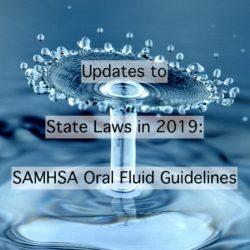
By Katherine Miller
This information is provided for educational purposes only. Reader retains full responsibility for the use of the information contained herein.
The past year brought about a myriad of changes to state drug testing laws, but perhaps the change with the furthest-reaching impact was the Substance Abuse and Mental Health Services Administration’s (SAMHSA’s) release of the Mandatory Guidelines for Oral Fluid Drug Testing (OFMG). Although the OFMG primarily impacts federal employees, there are a number of state laws that either require compliance with the SAMHSA guidelines, or defer to those guidelines in one way or another.
While other states may be impacted due to the OFMG, Kentucky, Maine, Puerto Rico, and Tennessee are the locations with the largest required changes to date. Employers should review all applicable state laws and local ordinances carefully to ensure that updates to drug-free workplace policies following the release of the OFMG are not required.
Kentucky
While all employers are not required to make changes to their drug-free workplace policies following the release of the OFMG, employers that choose to comply with Kentucky’s voluntary workers’ compensation premium discount program should make changes. Historically, only employers that have chosen not to comply with the state’s voluntary law have been able to perform oral fluid drug testing in Kentucky.
Kentucky’s voluntary law, found in 803 KAR 25:280, states that a drug test is a test that measures the presence, or absence, of a drug, or drug metabolites “…pursuant to standards, procedures, and protocols established by the U.S. Department of Health and Human Services’ Substance Abuse and Mental Health Services Administration.”
Although the law states that a drug test is pursuant to SAMHSA’s standards, it then goes on to state that urine is the appropriate drug testing specimen. While, in theory, Kentucky employers that comply with the voluntary law should be permitted to use oral fluid following the effective date of the OFMG, it is likely that employers will have to await some changes from the legislature prior implementing an oral fluid program.
Maine
Employers in Maine are required to comply with the state’s mandatory law, which is notoriously difficult to interpret, and often contradictory. Historically, oral fluid has only been permitted for POCT/rapid/instant purposes. The addition of the OFMG provide further guidance for employers in Maine, as Maine Rev. Stat. 26-7-3A-682 7 A states that any federally recognized substance use test can be used as a screening test (initial substance use test).
The OFMG now effectively permit lab-based oral fluid testing as a screening test method in Maine. Maine’s laws contain extremely specific cut-off levels and employers should consult the laws in their entirety prior to implementing an oral fluid testing program. The Maine Department of Labor also requires employers to submit their drug-free workplace policies for review prior to implementation.
Puerto Rico and Tennessee
Although Puerto Rico has a mandatory law (meaning private employers must comply), and Tennessee has a voluntary law (meaning employers can comply if they want to qualify for a 5% discount on their workers’ compensation premiums), their laws are worded and impacted similarly by the OFMG.
Puerto Rico’s law requires compliance with SAMHSA regulations in terms of specimens and dictates when alternative testing specimens can be used. Although technically once the OFMG are in effect employers should be able to use oral fluid, Laws of Puerto Rico 29-8-161b(b)(8)(d) states that all drug testing must take place using urine except when collection of a urine sample is not possible. In those cases, an alternative specimen can be used if approved by SAMHSA and the collection must take place following SAMHSA collection procedures.
Similarly, Tennessee’s law requires compliance with SAMHSA guidelines, which technically should permit oral fluid testing. However, Tennessee Comp. Rules & Reg. 0800-02-12-.06(4) states that urine is the correct specimen for drug tests, unless an employee is unable to provide a urine specimen, in which case the SAMHSA OFMG should be followed.
In both Puerto Rico and Tennessee, although SAMHSA compliance is required, employers are still only permitted to use lab-based oral fluid in extremely specific circumstances despite the release of the OFMG. While we may see some updates to these laws in coming years that allow oral fluid collections more regularly now that the OFMG have been released, for the time being, employers in Puerto Rico and Tennessee will only be able to use oral fluid as an alternative specimen option when a urine collection is unable to be completed.
Conclusion
While a number of states were impacted by the release of SAMHSA’s OFMG, if/when the Department of Transportation (DOT) releases their own oral fluid guidelines we will see even more changes to state laws. No matter what, prior to updating your drug-free workplace policy, ensure that you are in compliance with all applicable state laws and local ordinances by consulting laws carefully.
Need help updating your policy to include oral fluid? Contact CCG at policy@currentconsultinggroup.com. Want to ensure that you are up to date on applicable state laws? Subscribe to CurrentCompliance.org, the industry’s only state drug testing law database.
© 2010-2020 The Current Consulting Group, LLC – No portion of this article may be reproduced, retransmitted, posted on a website, or used in any manner without the written consent of the Current Consulting Group, LLC. When permission is granted to reproduce this article in any way, full attribution to the author and copyright holder are required.


